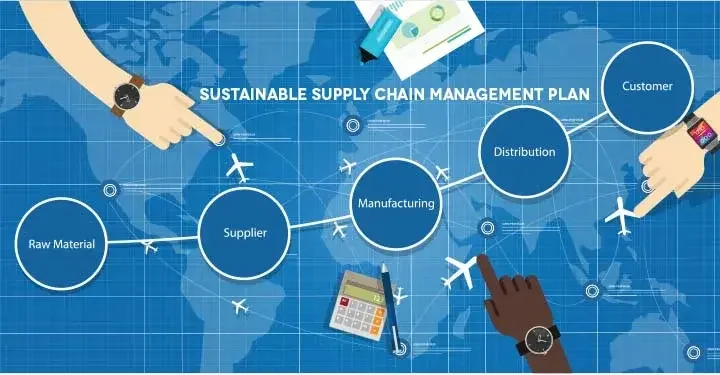Even if you aren't running a chain of big box stores like Walmart or a worldwide automobile manufacturing corporation, paying attention to sustaining your long-term supply chain is important.

What a supply chain is
A supply chain is a group of business organizations that are linked together to deliver goods to customers. The supply chain includes the companies that extract raw materials, develop them into product components, assemble components into end products, store the products, sell the end products to the end-user, and handle the transportation from one step to another.
The supply chain also can be broken down within parts or divisions of the same company, such as the warehouse and the sales outlet.
Any inefficiency or break in a supply chain can have a negative impact on other members of the chain. This can occur, for example, if there are inefficiencies in the transportation of materials or if a member of the chain goes out of business.
Supply chain management
Supply chain management, or SCM, is the process of sustaining—and maximizing the efficiency and effectiveness of—the supply chain. It involves not only the activities of each member of the supply chain but also the communication between them.
The movement of materials is called the physical flow, and the communication is called the information flow.
Since the phrase "supply chain management" was coined in the 1980s, it has grown into a very complex—some might say an overly complex—concept.
Some definitions of SCM are so lengthy and convoluted that they are difficult, if not impossible, to understand. Much of the complexity, and convoluted definitions, relate primarily to very large companies, such as Home Depot or Amazon. Such megacorporations have the power to exercise a considerable degree of control over the operations of other members of their supply chain.
The degree of control one company in the chain can exercise over the other companies is related to both its function in the chain and its size. A relatively small company that creates parts for General Motors will have much less control over the supply chain than General Motors itself.
In a large company, there may be employees whose sole or primary function is SCM. In smaller businesses, SCM may be just one of many responsibilities of a manager. The popularity of supply chain management has led to the creation of SCM college degree programs and organizations that provide SCM professional certification.
Creating SCM plans
A supply chain management plan will be unique for each business. If you are operating a small, localized business, then your supply chain management may only involve you and one or two suppliers. If you are operating globally, the SCM plan will be more extensive.
In any event, most SCM plans will involve:
- Creating suitable business documents, such as a product supply agreement and a distribution agreement
- Developing communication systems to be used among members of the supply chain, such as common software, ordering procedures, etc.
- Evaluating what should be done in-house and what can be done more effectively by outsourcing, increased outsourcing often increases the number of members of the supply chain, which makes SCM more complex and more important.
- Maintaining awareness of technological changes that may require alteration of the supply chain; may involve revising procedures among members of the supply chain, substituting a member of the chain, or adding or deleting chain members.
- Developing good relationships with supply chain members, which can include fostering a spirit of partnership; supply chain members can become dependent upon each other for their mutual success.
- Resolving problems between members of the supply chain
- Engaging in supply chain risk management to consider potential problems and developing contingency plans for dealing with these events; for example, exploring possible new suppliers in the event of the loss of an existing supplier.
Nonfinancial goals of the company also may come into play in SCM planning. For example, some companies desire to advance certain social, political, or environmental goals, which may be taken into account in their SCM plan.
To facilitate supply chain management, businesses have been created that provide SCM consulting services and specialized SCM software. More information and product supply agreement forms are also available from online sources.
Depending upon the size and nature of your business, your supply chain may be simple or complex or somewhere in between. Paying attention to the companies that make up your supply chain, and having some form of SCM plan in place, is important to your company's bottom line.

